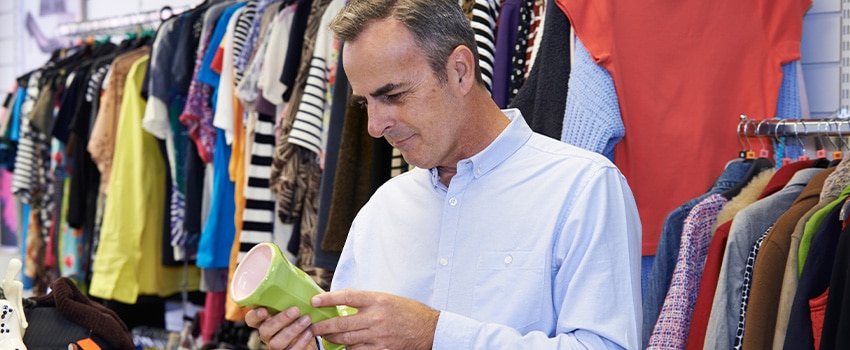As fast fashion sees a rapid decline, thrift stores enter a new chapter. The new generation of young people no longer see thrifting as something to be looked down on. Instead, shopping at thrift store has become the new fad.
In 2020, thrift shopping reached new heights. The industry was worth $28 billion in 2019 and is still expected to grow further and reach $64 billion by 2024. As the world enters a financial crisis and as fast fashion continues to be proven to have more issues than benefits, thrift shopping is the way to go.
Why People Go to Thrift Stores
A thrift store is usually the place where lower-income people go-to for clothes, furniture, and other household items that are sold at a discount price – and some even free. Throughout its early existence, thrift stores were organized by the community with the mindset of helping people who were financially challenged.
Items housed in thrift stores are usually donated by members of the community as well. Thrift stores like Goodwill and Salvation Army are two of the largest non-profit organizations in the United States that take donations to be displayed in their store.
Business analysts can cite various reasons why people go thrift shopping, and the most common is that one can actually save money. Since most items are being sold below or sometimes even half the retail price, people with limited funds can extend their budget and purchase what they need.
However, it is a different case with thrift shopping nowadays, especially when young people are involved. Here are the top reasons why people prefer shopping at thrift store.
1. Shopping At Thrift Store Is Sustainable
One of the issues regarding fast fashion is that for brands and companies who try to keep up with new collections every season, they have to continuously produce garments that are cheaply made and sold at an equally low price. More often than not, fast fashion brands imitate and mass-produce the trendiest items.
At the turn of the decade, fast fashion came under fire for being among the top industries that contribute to global pollution. Fast fashion was responsible for the large use of dyeing, yarn preparation, and fiber production that pollutes water sources and encourages massive land-use conversion. Research also shows that fabric production is the main cause of freshwater withdrawal in some areas. Fast fashion brands are also responsible for textile waste.
To put it simply, shopping at thrift stores encourages recycling. Not only that, giving pre-loved items a new life can reduce waste materials at an immense rate.
2. Shopping At Thrift Store Encourages Creativity
When looking for clothes, household items, and even furniture at a thrift store, people often encounter a wide variety of stuff. For teenagers and young adults, this encourages them to experiment with pieces and get into the fashion aesthetic that they like.
Aside from clothing, young people go to thrift stores for books. Selling books cheap gives more people access to bestsellers and different genres. From the Classics to the contemporary titles, readers will be surprised at the variety that is available at thrift stores.
Online Vs. In-Store Thrift Stores
2020 took the world by storm, and industries were not spared. One of the adjustments people have done in response to the pandemic is to do things remotely. Work? School? Groceries? Shopping? It’s all made remotely nowadays. Even thrift shopping is done remotely as well. Thrift shopping online has been booming since the start of the decade.
As the world enters its third year into the pandemic, people are now reliant on mobile phone apps for them to resume their usual activities, albeit remotely. Thrift store companies are also doing the same for their customers by encouraging thrift shopping online.
Companies such as Depop are bringing the thrift store online shopping experience right at the tip of their fingers. Instead of spending hours scavenging through piles of clothes, companies now display each item online. All you have to do is prepare your measurements, try searching for a fit, and check out.
It does not only minimize face-to-face interactions and the risk of being infected with the virus, but also minimizes the time spent shopping.
However, thrift store online shopping is applicable for big companies like Depop. Local, community-run thrift stores still maintain the old-fashioned way of displaying and selling items.
The Issues With Thrift Store Online Shopping
With the entrance of big companies in the thrift store industry, what was once a noble concept has quickly turned profit-driven. Researchers and concerned citizens voice out that the essence of the thrift store is being watered down as upper-income people flock to thrift stores to do their shopping as well.
While this is not to say that thrift store shopping should be gatekept from upper-income classes, the main objective of thrift stores is to provide clothing and other services to those who cannot afford to buy the newer stuff. It comes to a point where people would buy pre-loved clothing from thrift shops and resell them at a higher price to people who are thrift shopping online.
Organizations and individuals encourage everyone to go back to the roots of thrift shopping and engage in the ethical consumption of clothes.
Haven House Thrift Store Helps the Community By Supporting Addiction Rehab
Haven House Recovery aims to help men who are suffering from drug and alcohol addiction through a 12-month rehabilitation program. To finance the institution, Haven House Recovery needs the support of the community.
Haven House Thrift Store is among the well-rounded thrift stores in Destin, FL, selling not only clothes but jewelry, furniture, home appliances, and many more. The proceeds will be used to improve the facilities and the services for rehabilitation.




